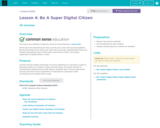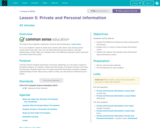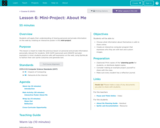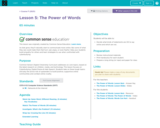
Learn the basics of creating online accounts, including creating secure passwords and keeping accounts secure. This Beginner lesson is approximately 20 mins.
- Subject:
- Technology
- Material Type:
- Lesson
- Provider:
- DigitalLearn
- Date Added:
- 03/20/2024

A collection of instructional materials on the topic of cybersecurity.

Learn the basics of creating online accounts, including creating secure passwords and keeping accounts secure. This Beginner lesson is approximately 20 mins.

This is the text, audio, and video [40:52] of Secretary of Defense Ashton Carter's Drell Lecture on innovation and cybersecurity delivered on April 23, 2015, at Stanford University, in Palo Alto, California.

Online tools are empowering for kids, and they also come with big responsibilities. But do kids always know what to do when they encounter cyberbullying? Show your students appropriate ways to take action and resolve conflicts, from being upstanders to helping others in need. This lesson aligns to national Computer Science standards from CSTA.

It's in our students' nature to share and connect with others. But sharing online comes with some risks. How can we help kids build strong, positive, and safe relationships online? Help your students learn the difference between what's personal and what's best left private. This lesson aligns to national Computer Science standards from CSTA.

Students will apply their understanding of sharing personal and private information on the web by creating an interactive poster in this mini-project. This lesson aligns to national Computer Science standards from CSTA.

As kids grow, they'll naturally start to communicate more online. But some of what they see could make them feel hurt, sad, angry, or even fearful. Help your students build empathy for others and learn strategies to use when confronted with cyberbullying. This lesson aligns to national Computer Science standards from CSTA.

This lesson is a guided tour of multifactor authentication and software updates that students can use to protect their data. Following these discussions, students are introduced to a stimulus question where they will apply their knowledge gained throughout the unit to answer questions about an innovations data, benefits and harms, effects, and security or privacy concerns.
This lesson is aligned to CSTA standards.

Students meet with their groups to develop a shared artifact or presentation that presents their collective vision for the Future School.
This lesson is aligned to CSTA standards.

Students will get feedback on their group innovation proposal from one other group. They will then have the remainder of the class to finalize their group presentation and individual proposals which will be presented and submitted in the following class
This lesson is aligned to CSTA standards.

Students will get feedback on their group innovation proposal from one other group. They will then have the remainder of the class to finalize their group presentation and individual proposals which will be presented and submitted in the following class
This lesson is aligned to CSTA standards.

The class begins a simulation which will continue on at different points throughout the unit. In this simulation, students take on the roles of different stakeholders in school communities converging at a convention where they eventually will deliver a proposal on the best computing innovation for the Future School. In this lesson, students explore what a computing innovation is, do a brainstorm activity, reflect on their character role, and finally learn how to research an innovation.
This lesson is aligned to CSTA standards.

Today is focused on researching three different computing innovations and discussing these innovations with team members.
This lesson is aligned to CSTA standards.

Students learn that the apps, websites, and other computing innovations they use every day require a lot of data to run, much of which they might consider to be private or personal. In the warm up students discuss which of a list of possible information types they consider private. Then students read the data policies from a website or service they use or know about. This investigation focuses on the kinds of data that are being collected, the way it's being used, and any potential privacy concerns that arise. A brief second activity reveals that even data that may not seem private, like a birthdate or zipcode, can be combined to uniquely identify them. To conclude the lesson students prepare for a discussion in the following class about the pros and cons of sharing all this data by journaling about their current thoughts on whether the harms of giving up this privacy are outweighed by the benefits of the technology they power.
This lesson is aligned to CSTA standards.

Students develop their own opinions on the privacy tradeoffs inherent in many modern computing innovations. At the beginning of the lesson students watch a video on facial recognition technology that presents the tradeoffs between convenience and privacy and asks them to determine whether they think the tradeoff is worth it. Students respond to two videos that look at different tradeoffs between privacy, security, and convenience. Students then evaluate the website or app they investigated in the previous lesson to determine if they think the benefits of the service outweigh the privacy risks. At the end of the class students discuss whether they generally think convenience outweighs privacy concerns.
This lesson is aligned to CSTA standards.

Students make further projects on their projects while also considering the unintended consequences their proposed innovations may have. First students watch a short video about the ways technology may have unintended consequences. Students then meet with their teams to review the different proposals for computing innovations that each team member is considering. Teams review the different ideas in character and help one another consider potential benefits and harms of each plan. Collectively they narrow down their proposals to a set that seem collectively most beneficial and present a coherent vision for the Future School. With whatever time is remaining students are able to work on one-pagers for the one innovation they chose.
This lesson is aligned to CSTA standards.

Students investigate three different common security risks (phishing, keylogging, malware) in a jigsaw activity. In groups, students create Public Service Announcement slides warning of the dangers of their assigned security risk. Then students are grouped with students who investigated other security risks and are instructed to share their slide and give a voice over. The activity ends with the class coming together to discuss the security risks as a whole.
This lesson is aligned to CSTA standards.

The lesson begins with a review of security risks by watching a video on Cybersecurity & Crime. Following this, the class does an investigation into the Equifax breach, and what went wrong. The class ends with a Kahoot quiz to review security risks.
This lesson is aligned to CSTA standards.

This lesson is primarily a work day for students to complete their innovation 1-pagers. Students should work close to their teammates in case they want to discuss ways to make their proposals more aligned around a cohesive vision for the Future School. Otherwise students should have the entire class period to work independently.
This lesson is aligned to CSTA standards.

In this lesson students explore two different encryption widgets: The Caesar Cipher Widget and the Random Substitution Cipher. Afterwards, students watch a video that reviews these types of encryption and introduces a new concept: public key encryption.
This lesson is aligned to CSTA standards.

In this activity students examine and learn about the various jobs and skills within cybersecurity careers.